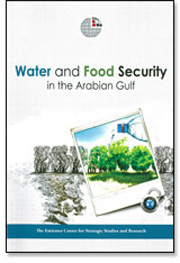Book contents
- Frontmatter
- Contents
- Figures and Tables
- Abbreviations and Acronyms
- Foreword
- Introduction
- Keynote Addresses
- Enhancing Water and Food Security in the Arabian Gulf
- Water, Food and Agricultural Challenges in the GCC
- Water Security in a Changing World
- Water Security in the Arabian Gulf Region
- Water Resource Management in the Arabian Gulf Region
- Regional and International Food Security
- Water and Food Security in the UAE
- Contributors
- Notes
- Bibliography
- Index
Water, Food and Agricultural Challenges in the GCC
from Keynote Addresses
Published online by Cambridge University Press: 05 September 2014
- Frontmatter
- Contents
- Figures and Tables
- Abbreviations and Acronyms
- Foreword
- Introduction
- Keynote Addresses
- Enhancing Water and Food Security in the Arabian Gulf
- Water, Food and Agricultural Challenges in the GCC
- Water Security in a Changing World
- Water Security in the Arabian Gulf Region
- Water Resource Management in the Arabian Gulf Region
- Regional and International Food Security
- Water and Food Security in the UAE
- Contributors
- Notes
- Bibliography
- Index
Summary
I would like to extend my thanks to the Emirates Center for Strategic Studies and Research for organizing this conference, and for raising such important topics relevant to the lives of citizens in all of the countries in the Arabian Gulf region.
The agricultural sector is undergoing significant development in the member states of the FAO Sub-regional Office for the Gulf Cooperation Council States and Yemen (SNG). Besides being an important economic activity, agriculture is a way of life which people depend upon to provide a living. The agricultural sector accounts for around three percent of total GDP in the GCC countries, and 19 percent of the population work in related economic activities in this sector. In general, agriculture plays a pivotal role in economic development and in achieving social stability and security.
By increasing production and added value, developing marketing and manufacturing, and providing employment opportunities, agriculture also helps in achieving food security and family and social stability, combating poverty and unemployment, curbing migration to urban areas, and preventing a number of social, economic and security problems.
Food security faces huge challenges, as the world's population is expected to rise from 7 to 9 billion by 2050. Furthermore, prices in emerging economies will force poorer sections of society to spend 50% of their income on food, and global demand for food will increase significantly.
- Type
- Chapter
- Information
- Water and Food Security in the Arabian Gulf , pp. 15 - 18Publisher: Emirates Center for Strategic Studies and ResearchPrint publication year: 2013

